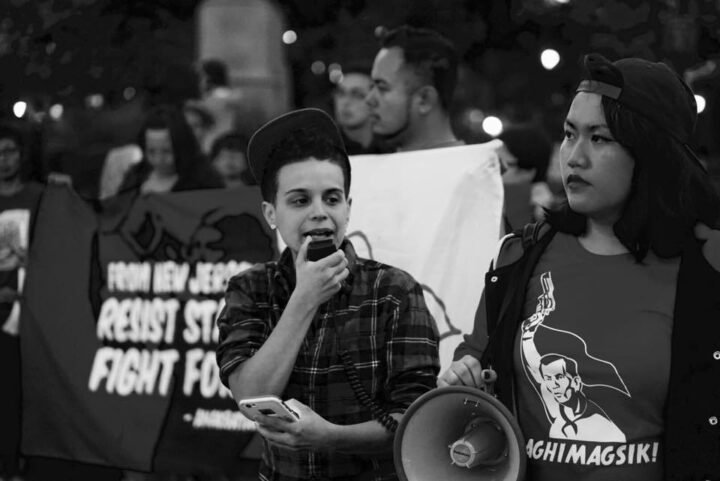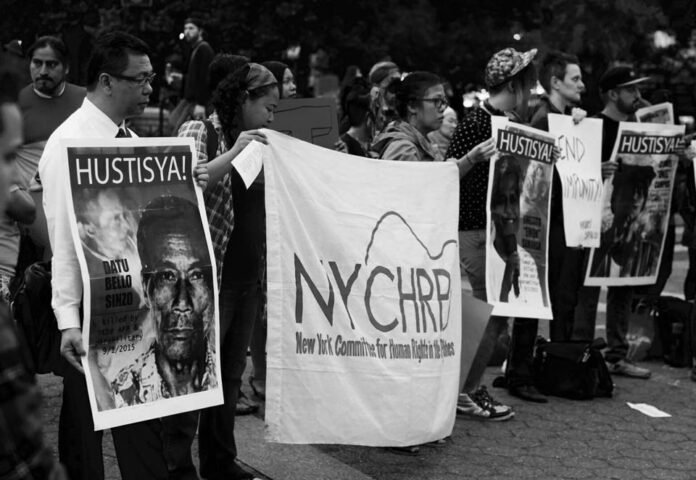Statement on the 43rd Anniversary of Martial Law in the Philippines
By New York Committee for Human Rights in the Philippines
On September 21, 1972, President Ferdinand Marcos declared martial law in the Philippines by ordering Proclamation No. 1081 and subsumed the country under military rule. He claimed to fight a war against “dangerous communists” and “insurgents.” Marcos’ ulterior motives for imposing martial law, however, was to quell dissent towards an already oppressive establishment that he led. Many activists and oppressed people were harassed, tortured, killed, and forcibly disappeared during this time as the military went on a rampage to exterminate the people’s spirit of resistance. The Filipino people’s discontent was caused by rising national debt, government corruption, underdevelopment of industries, privatization of basic services, and landlessness of peasant farmers who make up the majority of the population.
Despite its force, the military could not eradicate the people’s strength and power. They rose up and organized by the thousands to topple martial law and the Marcos dictatorship. The will and power of the people stopped martial law in 1981. However, the fight for freedom and an end to state repression continues today, four decades later.
We see the concrete realities of this continued struggle for resistance in the small community of Han-ayan, in the Caraga region of Mindanao. Caraga is one of the mining capitals of the world. It is rich in gold, bauxite, nickel and other minerals and precious metals. Foreign large-scale mining corporations from all over the world, particularly from Australia, Japan, and the United States, occupy Caraga to extract its wealth.
In Han-ayan, two schools were formed by indigenous Lumad people in response to the lack of education they receive from the government and a need to teach their youth their rights and a sustainable livelihood. The schools are Alternative Learning Center for Agricultural and Livelihood Development (ALCADEV) and Tribal Filipino Program of Surigao del Sur (TRIPFSS). These schools have aided in teaching the students not only literacy and arithmetic, but also lessons about how they can organize to stop foreign mining from encroaching on their ancestral lands and displacing them from their homes.
In 2010, a young man from Han-ayan was shot in the back by members of the military after he left his home before the 5:00 am curfew imposed by the Armed Forces of the Philippines to strip abaca in the forest. Stripping abaca, a strong fibrous plant which can be woven into useful products such as baskets and clothings, is how his family and many others in his community are able to provide for themselves. During the curfew, his family made less money because they could not begin working as early as they normally would.
His friends found him injured and brought him to a hospital, but that hospital refused to treat him, as did the next one after that. The third hospital attended to him but did not report the military issued bullet that they removed from his back even though it was protocol to do so. The hospital staff told him that he must have shot himself in the back. Since the shooting, he can no longer carry heavy loads or eat too much, which has harmed his ability to provide for his family. He has lived in constant fear of the military finding him again and completing the first task they had set to do. His story is just one example of the systematic oppression that others in Han-ayan live under.
When we ask who the military are protecting in Mindanao, our answer is clear. It is not the Lumad, who they kill, harass, and displace. It is the corporate interests of the foreign mining companies that the Lumad, who have ancestral rights to the land they pillage, have opposed. Can we say martial law has truly ended when young students still fear walking within their own communities because the military may target and kill them? Can we say martial law has truly ended when children are displaced from their homes and schools by the threat of military troops who will burn their buildings if they don’t leave? Can we say martial law has truly ended when leaders of schools that serve marginalized and oppressed populations of Lumad people are brutally targeted and murdered?
Marcos’s Martial Law officially ended over 40 years ago, but a new version has emerged under a different name and face. It was Oplan Banta Laya, under the Arroyo administration, which killed over 1,000 civilians. Today, it is Oplan Bayanihan, under current President Aquino, which is already responsible for the deaths of over 200 civilians. And it will continue under whatever counterinsurgency programs subsequent presidents introduce unless the people collectively resist state-sanctioned violence and repression.
Just as in the time of Marcos, the people continue to rage against the killing machine of the Philippine government, and we must support them in the face of escalating human rights injustice! As human rights activists in the United States, we have to oppose the fact that our tax dollars are used to fund the government death squads that target the Lumad and other peoples’ movements in the Philippines. NYCHRP supports fighting for a Philippines that is truly free from foreign domination and corporate greed. The people have proven themselves to be strong and they will be victorious in shutting down all forms of oppression once and for all through the fight for national democracy. National democracy is the only answer to ensure that foreign corporate interests will no longer determine what is good for the Filipino people, but that the Filipino people are able to reap the benefits of their own rich land and their own labor!
Fight for National Democracy in the Philippines!
Stop Lumad Killings!
Save Our Schools!

~~~
Reference:
Natalie Agosto
Mass Campaigns Officer, NYCHRP
nychrp@gmail.com
New York Committee for Human Rights in the Philippines (NYCHRP) is a local education and advocacy group based in New York City that works to promote social, economic, and political alternatives that foster democracy and peace based on justice in the Philippines and for Filipinos in the diaspora today.
NYCHRP shares the vision of human rights advanced by the National Democratic movement of the Philippines. NYCHRP educates, organizes, and mobilizes people and communities in NYC to take progressive action in upholding and supporting human rights in the Philippines and throughout the world.
For more information, please contact:
facebook.com/NYCHRP
NYCHRP@gmail.com
NYCHRP.info
@NYCHRP on Twitter & Instagram
Photos courtesy of Balitang NY.




